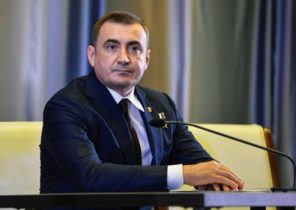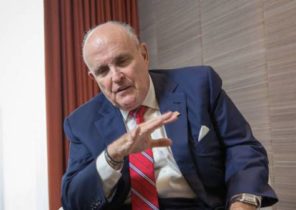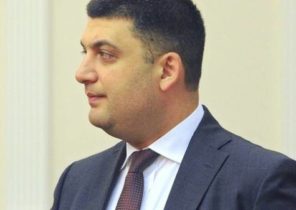
Finally, Gazprom succeeded, the Georgian side agreed to the changes, which are so persistently sought Russian gas giant last few years. But what benefits you get from the agreement, the transit countries — Georgia, pre-knowing that will lose out, but still agreed to the conditions of the occupant country — Russia? Maybe the noise and outrage caused by these changes are exaggerated and we should not dramatize the situation?
The “Georgia online”: At the last meeting of representatives “Gazprom” and the Ministry of energy of Georgia, which was represented by Kakhi Kaladze, the parties amended the agreement. The government of Georgia approved the new conditions, the President Giorgi Margvelashvili and many experts disapprove of the deal. Is there a danger that such concessions will again make Georgia dependent on Russian anagrafici?
Tengiz pkhaladze: I would not dramatize the situation, the main supplier of gas and other energy resources is Azerbaijan and this direction is especially important for our foreign policy accordingly to ensure our energy independence. With regard to the new agreement with Gazprom, Yes, the President praised as a step back, because the conditions written in the contract, worse than what was before. Under the old version, which operated the last 15 years, from the entire volume of gas pumped by Russia through Georgia to Armenia, we had 10% of the gas as transit fees. We now turn to the conditions of monetization that does not guarantee that the resulting sum will provide the same 10% of the gas. Ie, if tomorrow we will need to buy the 10%, there is no guarantee that economically we have nothing to lose. Here the question of the relationship of volume and price that was guaranteed by the previous contract, but not new.
In addition, a year ago, and then had a disagreement on the same issue, the President in his annual address to the Parliament clearly expressed its view that such negotiations should be conducted only with the consent of the country’s top leadership. We are talking about an elementary coordination in addressing such important issues as the agreement with Gazprom, and it is not a simple agreement between the two companies, there is more politics than energy. Unfortunately, we got what we have today. The President today addressed the Parliament, who under the Constitution controls the government. Let’s see how events will develop.
— The situation in Georgia is quite unfavorable, to return to the previous conditions is unrealistic. On the other hand, in the case of certain complications with Russia, which we cannot exclude, Georgia, for example, will not be able to block incoming Armenia gas…
— Eliminated! Talk about the fact that Georgia will block gas to Armenia, is favorable for those, who wants to drive a wedge in our relationship. Georgia is a reliable partner and we have proven this once again. Georgia is not going to block Russian gas supplies to Armenia, we are only talking about transit terms and in such negotiations by our counterparts is Russia. Speech absolutely about other — has changed the terms of the contract, but not in favor of Georgia.
— I meant the Kremlin style of relationship, i.e. if Moscow will start the same game with us as they did with Ukraine when it was off the gas, then raised the price, so we can not pay the amount that should…
We have repeatedly proven that they are reliable partners. Even during the 2008 war, when Russia bombed Georgia and we were the victims of Russian aggression, on our part, not for a moment was suspended transit commitments, including in respect of the aggressor country — Russia. Georgia is not only important but a reliable and responsible partner. If you remember, delivery to Armenia, was detained in 2006, when the Russian territory blew up gas pipelines, then Georgia was left without gas, but it is Russia’s responsibility, not ours.
— In September, Tbilisi hosted an international conference on energy security in our region and globally. How do You assess regional energy security today, as far as changes to the agreement may affect our energy security in the future? After all, everything revolves around transit routes, to some extent, perhaps, the beginning of the war of 2008…
— I would not say that the war was because of this that the Russian leadership stated that it was all thought out in advance to prevent Euro-Atlantic integration of Georgia. I don’t think a new agreement with Gazprom will affect the international image of Georgia, as we are not going to block the transit line. Gas went up to a new contract from Russia to Armenia, likewise, will come in the future. Outwardly, nothing has changed only the conditions for the country of transit country of Georgia, what we talked about above. The political leadership of Georgia, the President, the government, work on increasing geopolitical function of Georgia, we promote our new initiatives that fill not only the energy but also a transport corridor West-East, which, in turn, implies a very intensive relations not only with neighbors but also with international institutions, with the countries of Europe, Asia, Caspian region, etc. We try to involve the cooperation of as many countries.
Questions arise about the meetings of Karasin-Abashidze. The format includes talks on trade-economic and cultural relations. At the same time, Abashidze himself said that “no documents are issued, the parties undertake no obligations” that “the dialogue takes place in a relaxed atmosphere, this is the format of informal dialogue” and most importantly, that “we cannot agree”. But on the other hand, as far as I know, on the report of negotiation is the secrecy. If the negotiations don’t matter, then why meet and especially to classify them?
— By the way, the example I often cite to my students. The fact that if you delve into some of the subtleties of diplomacy, formal negotiations differ from informal meetings, but that does not mean that such meetings are not negotiations and no decisions are taken — here, the format is less formal and decisions are not legally formalized. In the official negotiations, the parties present the state delegation, a pre-defined agenda and prepared the agreement for signature. When two Nations have no diplomatic relations, the conduct of inter-state negotiations problematic. This form of “informal meetings” elected to have the parties more opportunities to communicate.
The format of Karasin-Abashidze still came to fruition and proved to be effective — Georgia may put their products on the Russian market, there is a cultural exchange. Improved economic, trade, cultural relations, in this sense, it was agreed, again, not making an international agreement. In international relations accepted this form and works between countries. With regard to formal talks, we have this format — the Geneva talks, which concerns the status of the serious issues that are a stumbling block in Russian-Georgian relations. Because of these problems we have no diplomatic relations with Russia, because Russia for us is the aggressor country, which occupied our territory, whereas the Russian Federation sees a completely different reality, radically different from ours. But the essence of the Prague format is that despite all these problems, we need to agree where possible, therefore, was elected as the format of Karasin-Abashidze.
— At the same time, we can say that this format gave a new impetus to Russian soft power in Georgia…
— I would not say that it started now. Let’s remember when Georgia abolished the visa regime with Russia? After the war. Russian investments, tourists were here before the creation of the format of Karasin-Abashidze, so don’t blame them that this format contributed to enhancing Russian soft power. We have not met and you will remember that back in 2009 we talked about the fact that Russian soft power in Georgia is very active.
But it is now much more active and free active, the broadcast of Russian state channels that promote the Kremlin’s policy, new non-governmental organization…
— They were and I wouldn’t have associated with this format. Here we are talking about a completely different — we’re talking about the tool and part of Russian foreign policy, which was very actively introduced in recent years, not only in Georgia but also in other countries. About the strengthening of Russian influence our centre is “international centre for geopolitical studies” in which I worked before my appointment as Advisor to the President, conducted research that showed that Russian soft power is gradually increased in Georgia. This process began much earlier, the strategy was developed before, and began to act earlier, but the fruits became apparent today. Did not pay attention to what we wrote and warned. That Georgia is still not prepared to prevent Russian propaganda and the influence of the so-called soft power, demonstrated by the reality that although we are not a unique country in this respect, a similar phenomenon is noticeable in many other countries.
Is a very serious issue is the opening of the Abkhazian section of the railway of Georgia. Perhaps the negotiations now underway, but we, ordinary citizens, know about this is always post-factum, as it was about the changes in the agreement with “Gazprom”. As you know, Russia demands from Georgia to accept new reality — the independence of the separatist Georgian regions of Abkhazia and South Ossetia. We have an absolutely opposite position. Tell me, the presidential group is working on this issue? If so, under what status you are considering Abkhazia and presentation of Georgia?
— First of all, there is such a stereotype that Georgia vs W/d messages that can pass through our territory, and taking into account our occupied region — Abkhazia. In principle, Georgia is most of all interested in normal transport links with the occupied regions and in the development of trade-economic and political relations with all neighbors. We talked about this and not in our interests isolation of our citizens and compatriots who live in the Russian-occupied Georgian territories. This applies to all, regardless of nationalities: Georgians, Abkhazians, Ossetians, Armenians, Greeks, etc.. what is happening there is our pain, therefore the Central authorities are most interested in Desolace and intensification of relations.
The question arises — if we are so interested in the development of our geopolitical function as a transit state, etc., then what is the problem, why isn’t it done?— Not because Georgia doesn’t want to, but because they do not want the Russian Federation. The reason is that it raises the question: if you want to have normal relations with their fellow citizens and with people who live in your territories, which were occupied by us, Russia, then accept the new reality that we just took some of these areas; acknowledge that this land is no longer yours, do not pay attention to the problems of those hundreds of thousands of people we kicked out of here, only because they are Georgians. Pay no attention to the fact that today we do destroy historical monuments under the Georgian language, just accept the reality, and then we’ll negotiate with you…
Put unrealistic conditions, moreover, the railway is not a trade corridor. Often put the question this way — here, we agreed on the trade corridor, when Russia joined the WTO, but it is not the definition of boundaries! The train must cross the border and where is the border, that we have very serious disagreements with Russia, because for us the border is in the same area, and for them to another. This is the stumbling block. Again, Georgia is more interested in the fact that those who live in Sukhumi, Gulripsh, Gagra, Gudauta, Gali and other places, would be the opportunity to visit other parts of Georgia; by to buy goods, products to sell, ie to have a normal relationship, was not afraid of the fact that there are treatments or come to visit relatives. We know that many hide it for fear of serious trouble there at home from the authorities.
When we speak about visa liberalization with the EU, we also note that this will spread to our compatriots living in the Russian-occupied territories of Georgia — Abkhazia and South Ossetia. But again, all these projects aimed to benefit the same population, hampered only by one thing — the position of the Russian Federation, which refuses to recognize the territorial integrity of Georgia. The issue can be resolved in seconds, if the Russian Federation will confirm tomorrow that recognizes the territorial integrity of Georgia and agree on de-occupation. But Russia does not, and all the arrows were always translated into Georgia.
We revolve around Russian-Georgian relations, but there is another problem — if earlier, on the agenda of the international institutions there was a question that Russia is the aggressor and occupier part of the Georgian territories that the ongoing movement of the Russian occupation line deeper into the rest of Georgian territory, today all of these organizations speak only about the occupation of Ukraine, Georgia would like forgotten and almost never mentioned.
— Allow me to disagree. Maybe we had a period when we are supposed to be much active policy in this direction, but perhaps we are less screaming and more work. Let’s start with the facts: the UN annually consider a resolution on the return of refugees, if you look at the dynamics, we see that every year an increasing number of countries support Georgia, ie, it already means that we work actively. Watch was a unique precedent, Tuvalu, Vanuatu, which recognized the independence of Georgian occupied territories, and withdrew its recognition in 2014. This is a step forward.
Recently, in may 2016, and the Council of Europe, at the level of the Council of Ministers had adopted a very important decision on the conflict of Georgia, by the way, this decision was not a few years! We received a very important document, which emphasized that the member countries of the Council of Europe supports the sovereignty and territorial integrity of Georgia within its internationally recognized borders.
It is possible to result many examples, applications and support our policy of non-recognition. I can say that every international President, I in virtue of his office to bear witness of this, begins with the question of non-recognition and everywhere very clearly raise the question of the occupied territories. To make it even more effective to make the policy of non-recognition, the President and the authorities are actively working in the international arena with States of Asia, Africa, Latin America, the recent visit of President Giorgi Margvelashvili to Brazil to witness. As for Ukraine, in 2014, speaking on the international podium, the President stressed that what is happening in Ukraine is a continuation of the Russian aggression against Georgia in August 2008. Today, international experts and politicians, speaking from high tribunes, recognize that if they paid due attention to the events of 2008 in Georgia, would not get Ukraine. By the way, we have ensured that in many international fora the issue of the Russian aggression in Ukraine is put together with Georgia.
Yes, today more talk about Ukraine, and this is the explanation: first, there was something that we did not have, there Russia has openly annexed part of Ukrainian territory — Crimea, although this danger exists here. We see the process of permanent occupation and annexation of the hidden. How many applications were made, including from the President, where he stressed and urged the international community to pay effective attention in order to prevent the continuation of the annexation. We achieved that was postponed a referendum on joining South Ossetia to the Russian Federation. Look at the activity of international leaders who come to Georgia just a few months ago, the presidents of Slovakia and Georgia together was at the occupation line and those photos spread all over the world. We do our best to show and remind the world about the occupation.
We intend to work more and every time to remind the international community about our problems, but again, given what happens in the world today: Syria, Crimea, migrants, the problems of Georgia are as if not paramount. We will continue to work to ensure that the issue of Georgia is not lost relevance and remained on the international radar.






